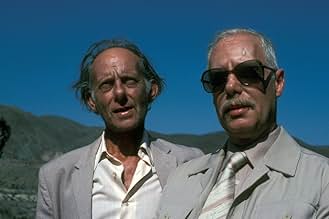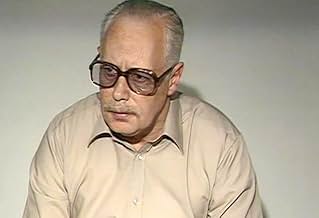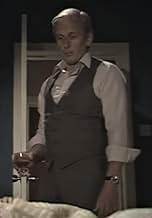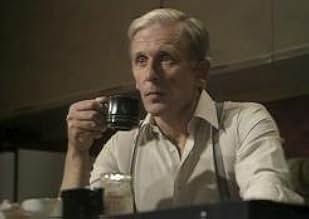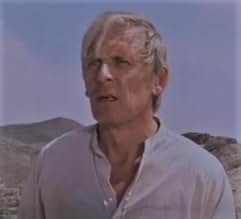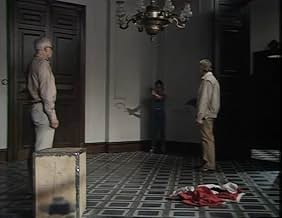Nos anos que se seguiram à Segunda Guerra Mundial, a situação virou: o ambicioso e cruel oficial da Gestapo Ludwig Kessler, o caçador mais implacável de todos os oponentes do Terceiro Reich.Nos anos que se seguiram à Segunda Guerra Mundial, a situação virou: o ambicioso e cruel oficial da Gestapo Ludwig Kessler, o caçador mais implacável de todos os oponentes do Terceiro Reich.Nos anos que se seguiram à Segunda Guerra Mundial, a situação virou: o ambicioso e cruel oficial da Gestapo Ludwig Kessler, o caçador mais implacável de todos os oponentes do Terceiro Reich.
Explorar episódios
Avaliações em destaque
However, would he have really made a fresh start in Germany rather than flee to South America?
I remember watching this when it was first shown on the BBC. It takes the story on, post-war, of what becomes of Gestapo chief Kessler. Hopefully UK Drama will show this - as they are now showing Secret Army.
All the superlatives about Secret Army apply equally to this. It may be a cliche, but drama like this makes the BBC license fee worthwhile!
All the superlatives about Secret Army apply equally to this. It may be a cliche, but drama like this makes the BBC license fee worthwhile!
"Kessler" reminded me of a TV adaptation of a Jack Higgins novel. (This might be seen as damning with faint praise.) Three members of "Lifeline" (the Belgian group that helped downed Allied flyers), appear only in the first episode, then the series shows an underwhelming West German security agent and an Israeli girl (played by a future Playboy model) tracking Kessler to South America where he meets other Nazis - the Kameradenwerk. At the inevitable confrontation, there's a prolonged debate about Kessler's philosophy and actions, during which the agent exclaims "words, just words; people are sick and tired of them", which prompted me to agree, so drawn out was the discussion.
With a cast comprising mainly C list actors, it's not difficult for Clifford Rose's performance to stand out. For nearly all the time he wears large-framed spectacles that obscure much of his face, and on the odd occasion when he removes them his face does not appear to have aged as much as the series' timeline might call for, but his movements are convincingly those of an old man. (He himself was then in his very early fifties.) He portrays a wide range of emotions: love for his dead wife (Madeleine) and his daughter, revulsion for the human experiments carried out by some of the Kameradenwerk, nostalgia for the Third Reich and dreams of a Fourth Reich.
With a cast comprising mainly C list actors, it's not difficult for Clifford Rose's performance to stand out. For nearly all the time he wears large-framed spectacles that obscure much of his face, and on the odd occasion when he removes them his face does not appear to have aged as much as the series' timeline might call for, but his movements are convincingly those of an old man. (He himself was then in his very early fifties.) He portrays a wide range of emotions: love for his dead wife (Madeleine) and his daughter, revulsion for the human experiments carried out by some of the Kameradenwerk, nostalgia for the Third Reich and dreams of a Fourth Reich.
The creators of this series originally intended to set it in an earlier decade - the 1960's - but the BBC objected on the grounds that this would cost more than a contemporary setting. The writers were told that it was deemed too expensive to hire 'period-appropriate' clothes, cars, props and locations; when they pointed out that the Kessler character would be quite ancient by the dawn of the 1980's (not to mention further removed from the events of "Secret Army"), the BBC executives apparently replied:"who cares, nobody will notice". Thus the cast and those behind the camera began the project with legitimate misgivings.
In "Secret Army", Kessler had a romantic relationship which made the character three dimensional and showed that even a cruel Nazi bigot had human dimensions. At the time, some people at the BBC felt that this factor might inspire too much sympathy for Kessler. Perhaps the Corporation's fear of the SS man being hero-worshipped explains why his loving companion makes no appearance in the subsequent series?
In "Secret Army", Kessler had a romantic relationship which made the character three dimensional and showed that even a cruel Nazi bigot had human dimensions. At the time, some people at the BBC felt that this factor might inspire too much sympathy for Kessler. Perhaps the Corporation's fear of the SS man being hero-worshipped explains why his loving companion makes no appearance in the subsequent series?
TalkingPicturesTV in the UK have aired the Secret Army series are now following with Kessler. When shown originally I missed much of both series due to work and family commitments. I am really pleased to be watching them - first The secret Army and now half way though Kessler.
Both have been a joy to watch with top-notch casting, scripts and filming that make we realise why I am so disappointed, with one or two exceptions, of most of the offers from modern film, streaming and TV. More so, to see some of the cast in their skilled and attractive youth I wonder why we haven't seen more of them over the years.
Both have been a joy to watch with top-notch casting, scripts and filming that make we realise why I am so disappointed, with one or two exceptions, of most of the offers from modern film, streaming and TV. More so, to see some of the cast in their skilled and attractive youth I wonder why we haven't seen more of them over the years.
Você sabia?
- CuriosidadesThe serial incorporates several elements of What Did You Do in the War, Daddy? (1979), the never aired final episode of Secret Army (1977) which was also written by John Brason: Kessler married his Belgian mistress Madeleine Duclos, who has since died, and has established himself as a major industrialist in West Germany under the pseudonym Manfred Dorf, Monique has a son in his twenties and returns to Brussels for the first time since the end of the war, Albert still owns the Candide in addition to six other restaurants and the surviving members of Lifeline reunite for the purposes of a documentary series entitled "In Our Time" which attempts to expose Kessler as a Nazi war criminal.
- Cenas durante ou pós-créditosThe opening titles start by displaying the letters SS which change to the name Kessler.
- ConexõesFollows Secret Army (1977)
Principais escolhas
Faça login para avaliar e ver a lista de recomendações personalizadas
- How many seasons does Kessler have?Fornecido pela Alexa
Detalhes
Contribua para esta página
Sugerir uma alteração ou adicionar conteúdo ausente

